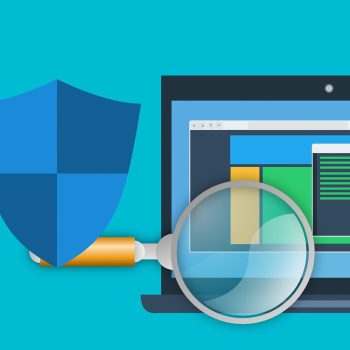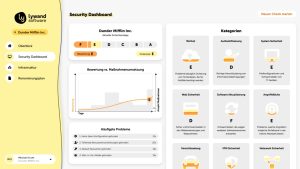
Automated cybersecurity checks make IT security that is becoming more complex more understandable. Large companies afford expensive tests of their IT security concept - what about less well-equipped medium-sized and small companies?
In IT security, a kind of rabbit-hedgehog race has been taking place between well-organized cyber criminals and their possible victims for years. Highly sensitive targets of attack on IT infrastructures such as those of financial institutions, authorities, health facilities, energy suppliers, telecommunications service providers but also large companies have long been a lucrative target of hackers.
All companies are one goal - including SMEs
Due to their relevance for customers or the public and the large extent of damage in the event of malfunctions, particularly critical goals place high demands on IT security services. In the meantime, numerous solutions are used in such companies to close all attack vectors in the network, in cloud environments, mobile devices, servers, endpoints, clients, e-mails or applications. In the best case scenario, the IT security community uses attempted attacks to improve existing solutions or to develop new services and tools. For companies that are considered high-profile targets, regular pentests, which sound out their IT environment in detail for potential attack scenarios, are an integral part of their IT security strategy. But what about less well-resourced medium-sized and small companies?
IT security gap in the corporate landscape
Time plays into the hands of cybercrime. With the advancing digitization of the economy, a new “market” opens up for their well-developed skills. Many companies that have a much lower level of maturity in IT security than the opponents hackers have previously had to deal with offer a large selection of possible victims with correspondingly high earnings prospects. Every company can be targeted by hackers.
In order to be able to siphon off these, hacker gangs are drawing together personnel capacities in order to extort ransom money with widespread ransomware campaigns or to steal data sets which they can then monetize through resale. The idea of industrial espionage is often associated with data theft, which is why some companies consider themselves to be an irrelevant target for cyber attacks. Unfortunately, this is a fallacy. In the digital age, stealing data can also be a means to an end. For example, hackers can use simple company documents with real contact persons and authentic email signatures to set up further fraud campaigns - either targeted or broadly. Therefore, companies should always consider digitization and the security of their data together.
Increased complexity
Medium-sized companies as well as small businesses that work digitally are faced with cyber criminals with a complex motivation to attack and a high level of skill. This means that a large number of attack vectors are conceivable that companies have to close from the outset.
Complex IT environments are an additional burden. Instead of just one anti-virus software, a multitude of solutions are now required for numerous attack vectors such as cloud environments, mobile devices, network connections, servers, endpoints, clients, e-mails and applications. In addition, there are social engineering attack tactics, in which criminals aim to trick company employees into using their legitimate accounts to exploit a loophole in the IT environment. In order to master such a complex risk structure, IT security solutions have been equipped with artificial intelligence and machine learning technologies in recent years. Their ability to recognize certain activity patterns and to draw conclusions from them should help to identify anomalies at an early stage and to be able to strengthen safety measures accordingly.
Review security measures objectively
Intelligent IT security solutions that work proactively and detect threats at an early stage are available in all price ranges and are therefore in principle affordable for every company. However, your security assessment is always only self-referential and therefore restricted. It is entirely possible that there are gaps between the individual security solutions. It can be assumed that the solutions used ensure complete security, but there is no objective verification. This leaves a little bit of uncertainty.
This is also a tricky situation for IT service providers. Every IT environment has individual characteristics, which is why a certain residual risk remains. How secure your customers are depends on their assessment and, to a large extent, on their imagination of possible attack scenarios. Pentesting, which could provide a little more clarity, is only carried out by service providers with appropriate security expertise and, due to the effort and costs, is only commissioned by a few customers at longer intervals.
Balance of power between company and hacker
Automation can help to shift this prevailing balance of power, which currently tends to favor hackers. Intelligent automation technologies can be used to test the IT environment and the protective layers of the solutions used against many possible attack scenarios. Such security scans provide a realistic assessment of the entire solution landscape and show where and how measures need to be strengthened.
Depending on the size of the company, the scans can be carried out at shorter intervals. This continuous review also gives those responsible feedback on the effectiveness of the additional measures they have taken, which can increase satisfaction with the work done. With this gain in control, capacities are freed up that IT service providers can use to effectively further develop a company's IT security strategy. In this way, they increase their chances of being able to counter cybercrime effectively in the long term.
More at Sophos.com
About Lywand Lywand Software offers a fully automated security review of the IT infrastructure for companies. For IT dealers, service providers and system houses who want to serve the needs of their small and medium-sized customers for IT security, Lywand simplifies the process of advice and product recommendation. Customers receive offers that measurably increase their security. Lywand is headquartered in St. Pölten, Austria.

